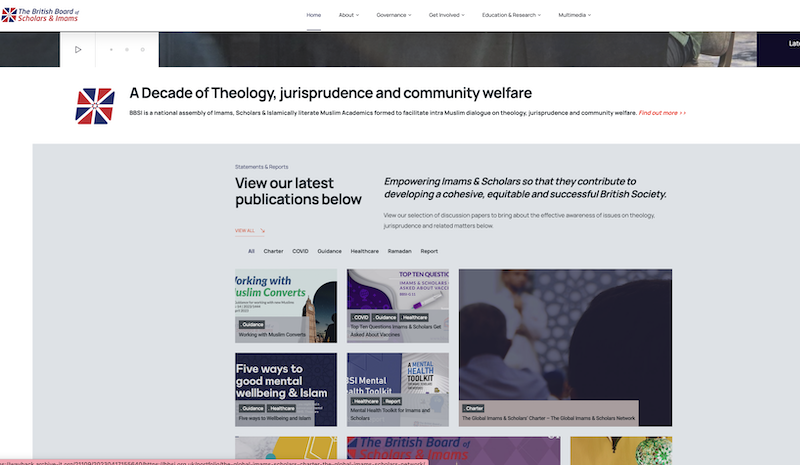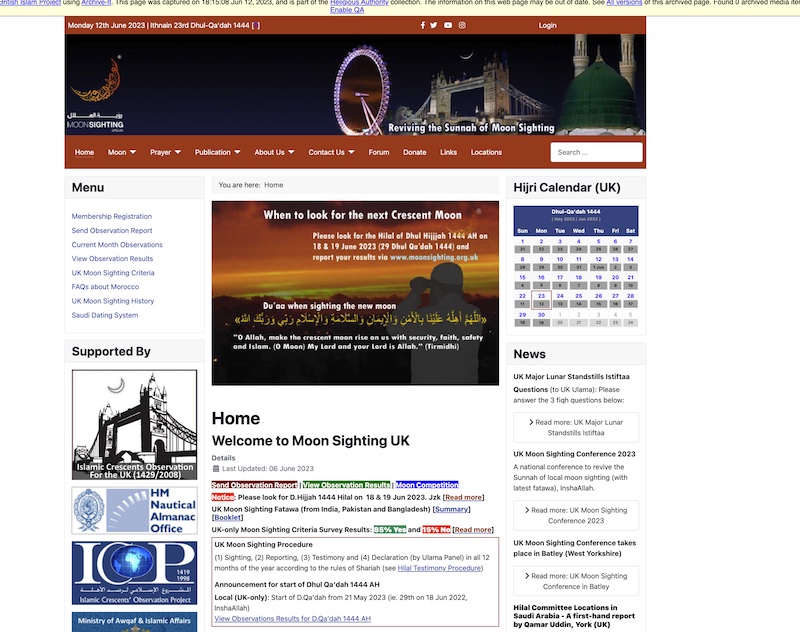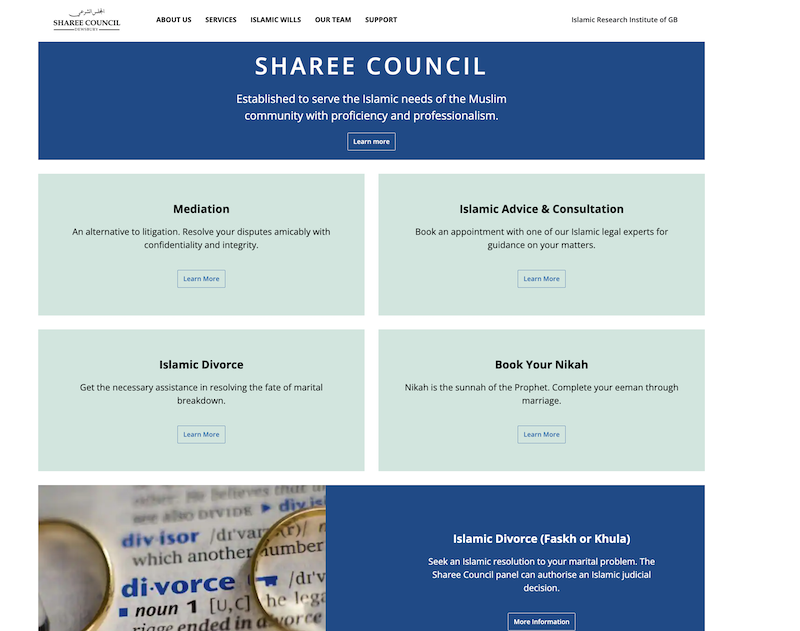The Religious Authority collection released as part of the Digital British Islam project, focusing on a key driver within cyber-Islamic environments at many levels. Cyber-Islamic environments is an umbrella concept for diverse and evolving online internet media identified (or self-identified) as affiliated with Islam and Muslims. The collection intends to present snapshot iterations of key websites within diverse British Muslim contexts, especially to show the dynamics of how authority manifests itself online. There will be, of course, crossover with other sections of our archiving collections (the subject of future discussion).
Religious authority has provided an essential subtext within online Islamic expression since the early days of the World Wide Web, and it has evolved in line with technological shifts, changes in digital access and literacy, and new and creative ways in which content creators have developed material for increasingly nuanced audiences. Religious authority manifests itself in complex and diverse ways, from interpretation of sources to guidance on ritual practices to responses to religious questions (including religious opinions or ‘fatwas‘). It may range from advice to more fixed and ‘compulsory’ elements of understanding. Forms of networking, allegiance and identity projection underpin notions of religious authority, which may emanate from ‘scholars’. However, they can also be presented by other channels and forms of ‘authority’ in a contested area of influence.[i] This is part of the varied and complex networks of affiliations and identities associated with Islam and Muslims in Britain.[ii]
Some readers might recall early versions of the World Wide Web in the mid-1990s, with their basic searchability functionality tied to a desk-bound machine. Compare that with the hypermobility of digital devices and content constantly streaming through multiple apps, channels and devices. The proliferation of content has saturated the information marketplace for religious authority.
This factor resulted in some interesting questions for the research team regarding which sites to select for archiving, the frequency of web capture, and how analysis should be approached. One researcher’s list of key sites will not necessarily correlate with others, which makes the process intriguing and lively. One apparent factor is that content is often ephemeral and can appear and disappear with regularity.

One of the purposes of the archive is to capture some of this transient content so that it can be evaluated not just now but by future researchers seeking to understand the dynamics of online discourse during the project period. The analogy would be a disappearing library where the books vanished from the shelves, never to be seen again; with an online archive, we can at least rescue some of this content being presented digitally within cyber-Islamic environments.
Some websites we look at act as hubs for specific identities, perspectives, organisations, and communities. The granulation of the online marketplace is reflected in the thousands of sites associated with Islam in Britain. Some are more proactive in updating their content than others, as seen in reviewing the initial archive collection. Some content providers regularly update their sites with articles, information, and advice, including responses to issues or, at the most basic level, information on prayer times and specific ritual/religious events, such as marking different periods during Ramadan.
Much of this is in conjunction with social media output, and there is a strong relationship between outlets such as X (formerly Twitter), Facebook, Instagram and web platforms in which content is integrated and interlinked. It is not possible within this project to capture social media due to the specific terms and conditions associated with these platforms and ethical considerations (alongside the enormous amount of data storage that would be required!). However, we link to specific social media sites and will discuss them within our output.[iii]
Some might say that websites are more ‘old fashioned’ within the contemporary context. However, they provide a permanent base and their archive of important events, figures, sermons, and valuable online resources. They might be seen as a bastion of stability within a frequently moving and updating digital and social media milieu. They are often the first point of contact between an individual and an organisation/platform. Their metadata impacts searchability when looking for material on specific themes, so websites can play an essential and authoritative role when individuals seek information and answers to questions about Islam and Muslims in Britain.

This phenomenon can be observed within those sites that project their religious authority through question and answer (Q&A) channels, through which questions are sent for scholarly and authoritative religiously-based answers.[iv] This is an extension of those channels that – in a pre-internet context – often required face-to-face communication (or a letter to an authority) and have opened up the information marketplace to an increasing range of ideas and responses, challenging what is sometimes seen as ‘conventional’ and ‘traditional’ channels of religious authority. Shopping around for opinions has been seen by some as a form of ‘edutainment’, where users search around for opinions that best match their circumstances and perspectives (a phenomenon which, to an extent, pre-dated the internet). They also have a role as a forum through which ideas about religious authority can be explored safely, incorporating searchability and exploring sensitive issues that would not be comfortably addressed within local community contexts.
Some online authorities have developed extensive profiles beyond their local, regional, or national status, extending audiences for ideas through digital proficiency, investment in resources, development of effective interfaces, and utilisation of network opportunities. Through this archive, we can explore some of these phenomena, and we will be looking at them in more detail as the project progresses, especially in line with other sectors of the project, including our survey and interviews.[v]
Digital British Islam operates in a context in which people go to the internet as a primary resource to obtain answers to questions and explore religious issues. Exposure to external influences, including a generation of so-called influencers, has opened users up to expectations of instant responses to religious questions, online justification through religious sources for particular actions on contemporary concerns, and affiliation to religious perspectives that may fall out of their traditional and ancestral contexts, consequently leading to a shifting in personal understandings and identities associated with being a Muslim in Britain.

By capturing these influences in this archive, we will have the basis of fixed source materials enabling detailed analysis and discussion at this pivotal moment within the development of Muslim communities and identities in Britain. Through exploring the archive (curated by our team), we provide an introduction through the annotated and tagged content to different sectors within Islam and Muslim societies in the UK as a quick and easy means of getting an overview of how Islam is presented digitally.
This archive collection is a work in progress. We intend to expand our analysis and content tagging in due course, connecting different aspects of the project. We will make further inroads into collecting and drilling down on content as Digital British Islam progresses. In the meantime, we hope you will enjoy exploring Digital British Islam’s initial archive when it is launched and look forward to user feedback in due course.
[i] Discussed in detail in Gary R. Bunt. iMuslims: Rewiring the House of Islam. (Chapel Hill: University of North Carolina Press, 2009). —. Hashtag Islam: How Cyber-Islamic Environments Are Transforming Religious Authority. The University of North Carolina Press, 2018).
[ii] Sadek Hamid. Sufis, Salafis and Islamists: The Contested Ground of British Islamic Activism. (London: Routledge, 2017). 25-30. Sophie Gilliat-Ray. Muslims in Britain: an introduction. (Cambridge: Cambridge University Press, 2010).
[iii] Gary R. Bunt. “Starting Points: Initial Methodological Approaches to Archiving Digital British Islam.” Digital British Islam. 3 August 2023, https://digitalbritishislam.com/archiving-starting-points.
[iv] Gary R. Bunt. Islam in the Digital Age: E-jihad, Online Fatwas and Cyber Islamic Environments. (London & Michigan: Pluto Press, 2003).
[v] For an overview of project approaches, see Digital British Islam. “Insights.” https://digitalbritishislam.com/insights/.
